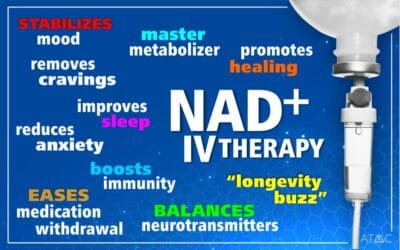Last Updated on September 13, 2022 by
Alternative to Meds Editorial Team
Medically Reviewed by Dr Julia Britz NMD
Table of Contents:
NAD+ is a powerful molecule found in every single cell of the body. Its job is to assist in biochemical reactions and supply the mitochondria with the energy it needs to maintain good sleep, stabilize mood, and ensure our immune systems work properly. This makes NAD+ IV therapy an essential therapeutic tool.
What is NAD+ IV Therapy and How Does it work?

When the body has all the necessary ingredients for this process, our cells are well nourished and we feel good! When we don’t have them, we feel weak and sick. So, here’s where it gets interesting …
Around age 25 our body really slows down in the production of NAD+.1 An adequate level of NAD+ plays a protective role against cell degradation and aging. In fact, researchers in neuroscience are now calling NAD+ “the anti-aging molecule.”10 Not only does getting older decrease our storage of NAD+, but so does stress, chronic illness, poor sleep, overeating, and drug/alcohol use. Our bodies do naturally continue to produce small amounts of NAD+ from tryptophan and aspartic acid in combination with niacin (vitamin B3) — but real magic happens when we get therapeutic NAD+ IV doses.2,9
When I say “magic,” I’m not kidding.
Benefits of NAD+ IV Therapy
Deficient or depleted levels of natural chemicals such as gamma-aminobutyric acid (GABA), serotonin, and dopamine — can be restored naturally, for instance, with diet and supplementation. With depleted NAD+ levels, we tend to also see low dopamine.3 NAD+ helps restore these neurotransmitters, and IV therapy may provide relief.
NAD+ can be considered for people with a variety of conditions.4-12
Conditions that restoring NAD+ may help include:
- Addiction
- Medication tapering support
- OCD (obsessive-compulsive disorder)
- Anxiety
- Depression
- Psychosis
- Schizophrenia
- Alzheimer’s
- Parkinson’s
- Chronic Fatigue Syndrome
- Age-related degenerative conditions
- Psoriasis
- Reversing neurodegenerative decline
- Glaucoma, age-related macular degeneration
 Tryptophan turns into NAD+ in the liver, which is partially why alcohol and drug use deplete it. NAD+ therapy is done intravenously over a few hours. Most people notice improvement very quickly which is one reason I like it so much. When I say “improvement” what I mean is that people report improved sleep, more stable mood, better energy, and reduced/eliminated tapering symptoms.
Tryptophan turns into NAD+ in the liver, which is partially why alcohol and drug use deplete it. NAD+ therapy is done intravenously over a few hours. Most people notice improvement very quickly which is one reason I like it so much. When I say “improvement” what I mean is that people report improved sleep, more stable mood, better energy, and reduced/eliminated tapering symptoms.







